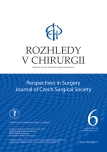-
Medical journals
- Career
Iatrogenic thoracic aortic injury in esophagectomy – a case report and literature review
Authors: R. Vrba 1; Č. Neoral 1; R. Aujeský 1; P. Špička 1; P. Utíkal 2
Authors‘ workplace: I. chirurgická klinika Fakultní nemocnice Olomouc 1; II. chirurgická klinika Fakultní nemocnice Olomouc 2
Published in: Rozhl. Chir., 2019, roč. 98, č. 6, s. 256-259.
Category: Case Report
Overview
Introduction: This case report describes bleeding from an iatrogenic thoracic aortic injury in minimally invasive thoracoscopic esophagectomy.
Case report: A 53-year-old man underwent neoadjuvant radiochemotherapy for adenocarcinoma of the esophagus with positive lymph nodes. PET/CT showed only a partial response after neoadjuvant therapy. Minimally invasive thoracoscopic esophagectomy in the semi-prone position with selective intubation of the left lung was performed. However, massive bleeding from the thoracic aorta during separation of the tumor resulted in conversion from minimally invasive to conventional right thoracotomy. The bleeding was caused by a five millimeter rupture of the thoracic aorta. The thoracic aortic rupture was treated by suture with a gore prosthesis in collaboration with a vascular surgeon. Esophagestomy was not completed due to hypovolemic shock. Hybrid transhiatal esophagectomy was performed on the seventh day after the primary operation. Definitive histological examination showed T3N3M0 adenocarcinoma.
Conclusion: Esophagectomy for cancer of the esophagus is one of the most difficult operations in general surgery in which surgical bleeding from the surrounding structures cannot be excluded. Aortic hemorrhage is hemodynamically significant in all cases and requires urgent surgical treatment.
Keywords:
cancer of the esophagus – esophagectomy – injury of the aorta
Sources
-
Meng F, Li Y, Ma H, et al. Comparison of outcomes of open and minimally invasive esophagectomy in 183 patients with cancer. J Thorac Dis. 2014;6 : 1218−24. doi:10.3978/j.issn.2072-
1439.2014.7.20. -
Zhai C, Liu Y, Li W, et al. A comparison of short-term outcomes between Ivor-Lewis and McKeown minimally invasive esophagectomy. J Thorac Dis. 2015;7 : 2352−8. doi:10.3978/j.issn.2072-1439.2015.12.15.
-
Chiba K, Abe H, Kitanaka Y, et al. Conventional surgical repair of traumatic rupture of the thoracic aorta. Gen Thorac Cardiovasc Surg. 2014;6 : 713−9. doi:10.1007/s11748-014-0422-x.
-
Shim H, Jeon CS, Park PW, et al. Perioperative outcomes of repeated open surgery on the thoracic aorta. Heart Surg Forum. 2018;18;21:E263−E268. doi:10.1532/hsf.2004.
-
Bonavina L, Bona D, Saino G, et al. Injury of the thoracic aorta during laparoscopic esophagectomy. Surg Laparosc Endosc Percutan Tech. 2009;19:E55−6. doi:10.1097/SLE.0b013e3181a02ff3.
-
Matono S, Fujita H, Tanaka T, et al. Thoracic endovascular aortic repair for aortic complications after esophagectomy for cancer: report of three cases. Dis Esophagus. 201;24:E36−40. doi:10.1111/j.1442-2050.2011.01234.x.
-
Javed A, Pal S, Chaubal GN, et al. Management and outcome of intrathoracic bleeding due to vascular injury during transhiatal esophagectomy. J Gastrointest Surg. 2011;15 : 262−6. doi: 10.1007/s11605-010-1375-8.
Labels
Surgery Orthopaedics Trauma surgery
Article was published inPerspectives in Surgery

2019 Issue 6-
All articles in this issue
- Development of vascular substitutes for low-flow peripheral bypass grafting – a review
- Splanchnic vein closures
- Bleeding from lumbar ventral epidural venous plexus managed with hemostatic agent from oxidized non-regenerated cellulose
- Catheter laser ablation of superficial veins of the lower extremities in the symptomatic treatment of venous reflux − comparison of the immediate results of two types of laser
- Iatrogenic thoracic aortic injury in esophagectomy – a case report and literature review
- Mladí, chcete operovat? Přidejte nám na důchody!
- Combined endovascular and surgical treatment of symptomatic tandem occlusion of common carotid artery and middle cerebral artery – case repor
- Madelung’s disease – a case report
- Perspectives in Surgery
- Journal archive
- Current issue
- Online only
- About the journal
Most read in this issue- Madelung’s disease – a case report
- Splanchnic vein closures
- Combined endovascular and surgical treatment of symptomatic tandem occlusion of common carotid artery and middle cerebral artery – case repor
- Development of vascular substitutes for low-flow peripheral bypass grafting – a review
Login#ADS_BOTTOM_SCRIPTS#Forgotten passwordEnter the email address that you registered with. We will send you instructions on how to set a new password.
- Career

